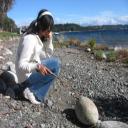Yahoo Answers is shutting down on May 4th, 2021 (Eastern Time) and beginning April 20th, 2021 (Eastern Time) the Yahoo Answers website will be in read-only mode. There will be no changes to other Yahoo properties or services, or your Yahoo account. You can find more information about the Yahoo Answers shutdown and how to download your data on this help page.
Trending News
Is the female menopause a direct link to human evolution?
The average age of human life, up until the industrial revolution some 300 years ago, steadily increased from approx 40 years to between 60 or 70 years. Nowadays we can expect to live to between 70 to 90 years, maybe even longer. My question is this; if the menopause occurs in modern middle-aged women, roughly between 45 - 55 years old, does this mean that it never happened to women when life expectancy was much younger?
Has there ever been any scientific research into this and if so, what were the results? If there hasn't been, do we know that a menopause is a natural phenomenon, or is it a limit nature has imposed for a certain reason? The results of this could be fascinating if it never occurred previously, and just as interesting if it did! I am posting this to both the social science questions and also religion & spirituality as I think the answers from both communities could be great to read...
Very, VERY good point Chaos Theatre...
5 Answers
- Anonymous1 decade agoFavorite Answer
Cant and co-author Rufus Johnstone, an evolutionary biologist at the University of Cambridge in England, used game theory to argue that menopause is early cessation of reproduction that originated through reproductive conflict between generations. In most cooperatively breeding species, reproduction is suppressed in younger females, who act as helpers to older reproducing females. By contrast, they say, younger women in human social groups win the reproductive sweepstakes, because the older ones stop having babies.
"We showed that, compared to other primates that exhibit a post-reproductive life span, humans really stand out, because there is absolutely no overlap in reproduction between generations," Cant says. "Women stop breeding on average when the next generation starts to breed."
This makes evolutionary sense, Cant and Johnstone say, because, contrary to most mammals, young women tend to move to their mates' communities, where they become immigrants whose only genetic kin are their own children. There is no genetic profit in helping their mothers-in-law bear more children, because they will not share any genes with those children. But an older woman who helps her son's wife reproduce will benefit by bequeathing 25 percent of her genes to her grandchildren.
"We show that the mother-in-law's best strategy is to stop breeding, avoid competition, and allow the daughter-in-law to breed and help her," Cant says. "It's the first time anyone has taken the idea that humans evolved with this sex bias in dispersal and looked at the implications for how these conflicts will be resolved within the family."
The mother of the grandmother hypothesis, anthropologist Kirsten Hawkes of the University of Utah, says Cant and Johnstone are right to focus on intergenerational conflict. Elephants have babies in their 60s, and some whales give birth in their 80s. "It's clearly something selection can adjust," she says. "So explaining why it hasn't in us has to be part of the story." But she disputes their claim that female-bias dispersal is, in fact, the universal human/ape residence pattern, pointing out that half of the young female chimps at anthropologist Jane Goodall's Gombe Stream Research Center remain with their mothers, and that recent studies show that hunter-gatherers often live with the wife's family as well.
Another explanation for menopause is the "mother hypothesis," which holds that it occurs because older mothers might profit more, genetically speaking, by investing resources in their existing children than in giving birth to new ones. Researchers at the Max Planck Institute for Demographic Research in Rostock, Germany, make the case for this in the American Journal of Physical Anthropology (AJPA), concluding that menopause is advantageous when a woman has aged enough to face an increased risk of stillbirth, birth defects and her own death in childbirth.
Researchers of a different AJPA study, based on 400 years' worth of data on births in Costa Rica, believe that postmenopausal longevity is associated with an increased number of children but a decreased number of grandchildren—a finding that supports mothers over grandmothers.
"We're not saying grandmothers do not provide benefits in some societies," says study co-author Lorena Madrigal, an anthropologist at the University of South Florida in Tampa. But, "we should not assume that one pattern fits all."
Data on great ape fertility is spotty, but what there is shows that our closest relatives—chimps, bonobos, gorillas, even orangutans—stop having babies about the same age that we do: the late 30s. The difference is, they generally die a short time later. "The thing that makes us different from apes is not the age of fertility decline, it's the lack of aging in other systems," says Hawkes. "I have been saying this for a long time and I don't think it's what anybody is hearing. Probably what a lot of people are prepared to listen to is the way Cant and Johnstone have framed this, that the real question is: 'Why do we stop [reproducing] so early?' I think the bottom line is that, compared with our closest living relatives, we don't."
I'm not personally very keen on these studies, they have a long way to go with these theories.
Not a lot of studies have been done on menopause in women, and there is no real documented history.
If women in past decades gave birth to many children, by the time their fertility had decreased at menopause they were likely in poor health and close to the end of their lives. Repeated childbirth takes it toll on women's bodies but some did experience menopause in the distant past. As for it happening at an earlier age than it does now, one can only speculate.
- ?Lv 61 decade ago
It occurs in other long-lived social mammal species, like whales: http://www.frontiersinzoology.com/content/6/1/4
"Menopause is a seemingly maladaptive life-history trait that is found in many long-lived mammals. There are two competing evolutionary hypotheses for this phenomenon; in the adaptive view of menopause, the cessation of reproduction may increase the fitness of older females; in the non-adaptive view, menopause may be explained by physiological deterioration with age. The decline and eventual cessation of reproduction has been documented in a number of mammalian species, however the evolutionary cause of this trait is unknown".
So no, not limited to just human evolution.
- Anonymous1 decade ago
Interesting, but evolution is a way of progressing the species forward, so if it really was imposed by nature wouldn't it make more sense for the biological time-frame in which women are fertile to be widened along with the lifespan?
Sorry if that doesn't make much sense.
- The RockLv 61 decade ago
Golden Rule:
It is never wrong to live.
I think it's just evolution. Nature never thought that we'd end up with such long lifespans. Due to that, we run out and go into menopause.
- How do you think about the answers? You can sign in to vote the answer.
- Anonymous1 decade ago
Some women can get menopause as early as in their 20's. This is natures way of saying that women's sole purpose is for breeding and not for living.
It is unnatural for any female to live past 30. No other female species in the animal kingdom live long enough to get menopause etc etc



